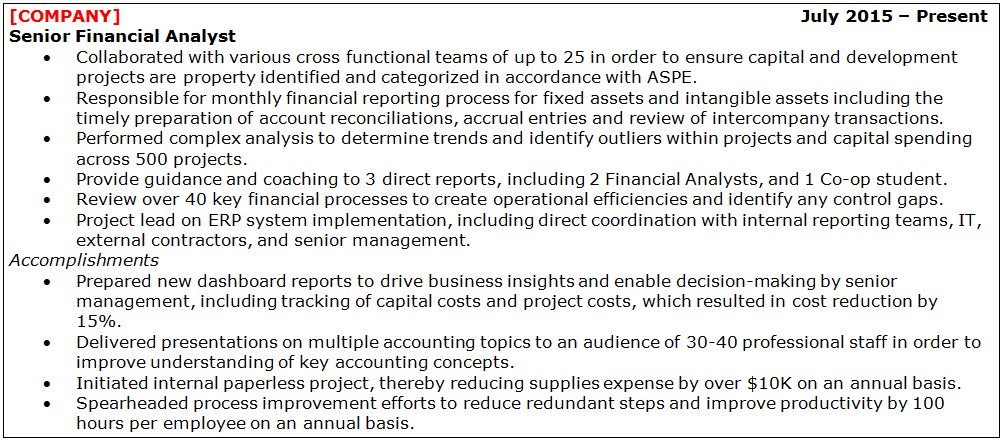A resume is part of your brand. It communicates an important message: Who I am, What I do, and How I do it.
After reviewing thousands of CPA resumes, and working with hundreds of candidates on their job searches, here are some insights on how to strengthen your resume and improve your chances of capturing a hiring manager’s attention.
However, before we get started, it’s important to note the outcome we’re aiming to achieve.
The goal of revising your resume shouldn’t be to:
- Add more content in an attempt to explain everything you’ve ever done
- Include every possible keyword to clear any-and-all filters
- Use multiple fonts and designs from templates in an attempt to “modernize” it
A strong resume should:
- Highlight your skill-sets in a easy-to-read format
- Deliver key accomplishments to focus the reader’s attention on your track-record
- Be concise, flow well, and build a case for your candidacy
The 3 tips are as follows:
1. Include Summary of Skills/Qualifications
Instead of a block of text summarizing your resume, or having an objective statement, consider including a “Summary of Skills/Qualifications” at the top of the first page. Ensure it is formatted into three columns of bullet-points, with each point between 1-3 words. This section should speak to FOUR main aspects of your skills:
- Technical – examples would include “financial reporting”, “consolidation”, “IFRS”, “US GAAP”, “SOX”, “P&L forecasting”, “KPIs/Dashboards”…
- Software – could encompass any ERPs or specialized-software that you are familiar with and can use in a new role relatively quickly. “SAP FI/CO”, “JD Edwards”, “Great Plains”, “Advanced Excel (macros, pivot, lookups)”…
- People Management/Team Experience – mention the smallest and largest team sizes you’ve managed. If you haven’t had direct reports, consider mentioning the sizes of teams you’ve collaborated with in your roles. “Managed 4-10 direct reports”, “Coaching/mentoring”, “Performance evaluation”, “Hiring/training”…
- Industry-specific Knowledge – this can relate to industries where specific bodies of knowledge are relevant. For example, a professional working in financial services may have experience with “OSFI”, “FSCO”, “AML”, “FATCA”, etc. Conversely, a professional from manufacturing may have exposure to “standard costing”, “Lean Six Sigma”…

This section is as an excellent way for recruiters to keep track of your profile for specific roles. (And keyword searches become much easier!)
2. Include Accomplishments
Apart from mentioning your job responsibilities, consider including an “Accomplishments” subsection under each of your roles. Mention 3-4 key results achieved, or recognition received. These can relate to process improvements, consistently achieving your internal metrics, new business obtained, or savings realized through efficiency.
Consider the following two statements. Which reads better? 1 or 2?
- Used Excel to improve the reporting process by developing a reporting template.
- Utilizing advanced Excel macros, developed a reporting template which minimized errors and reduced the month-end closing period from 7 days to 5 days.
The second, right? It shows how you improved the reporting process, shows the benefits realized, and also quantifies the benefits realized.
For any accomplishment, try to quantify the benefits as best possible. For example:
- Through active project management, leveraging international resources, and collaborating with international analytics team improved recovery on engagements by 25%.
- Led a team of 12 audit and transaction advisory professionals through a public company carve-out engagement (~650M USD) and consistently met all milestones, resulting in additional non-assurance service offerings of 100,000 USD.
3. Manage Flow, Length, and Formatting
“What you say and how you say it, are of equal importance.”
– Words of wisdom from my Grade 11 English teacher.
I have seen many resumes with a checklist format for describing job responsibilities. “I’ve prepared financial statements“, “I have done consolidations“, “I’ve done G/L reconciliations“, “I have project management experience”…
This format can easily lose a reader’s attention and result in your profile being rejected, even if you may bring the right experience. In order to keep a hiring manager’s attention, it’s important to group content into a more organized bullet-point format and have the content flow. Consider the following:

Each point above flows well into the next point. At one glance, you can determine the size of the team, the financial reporting framework, a few key functional responsibilities, the number of projects, followed by people management experience, and other ad-hoc aspects of the role.
As a recruiter, I invariably get asked about the appropriate length of a resume. It should be commensurate with the years of experience you bring, while balancing it with the relevance of those experiences to a given targeted role. As a result, a new grad’s resume should ideally be no longer than one page. Whereas, if one has been working for 25 years, it’s best to condense work experiences prior to 10 years in a format which shows the company name, the role, and the time period. This is in order to avoid having a 4-5 page resume.
From a formatting perspective, it’s best to choose a legible font (like Verdana or Times New Roman) and to avoid using multiple font styles and sizes. As long as the format is consistent throughout the resume, it’ll be easier on the eyes and would invite a reader to invest time in reading the content.
Bringing It All Together
A resume represents your brand. Hiring managers may not spend a lot of time reviewing resumes and, therefore, to capture their attention, one should:
- Include a Summary of Skills at the top;
- then expand on Accomplishments/Results Achieved to serve as a track record;
- and overall balance the content with appropriate formatting and concise points that relate to the targeted role.
At Lannick, we specialize in working with designated CPAs and other finance, accounting, and technology professionals. As part of the Lannick candidate experience, we provide in-depth resume critiquing services and other personal branding suggestions to enable your profile to stand out amidst the competition.
For any questions about the Lannick candidate experience or to get started with your next job search, feel free to contact me directly or register with Lannick below.


